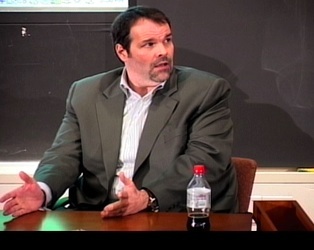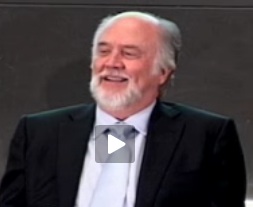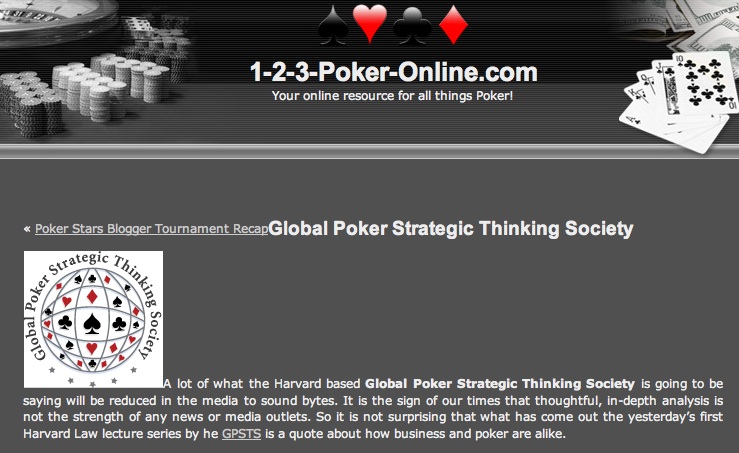Archive for the 'poker' Category
Page 4 of 7

start at 6:13
follow this script
howard on the button
kaplan in the big blind
table folds to howard
howard raises
kaplan calls
:fill in the story kaplan is telling himself when he calls
::he’s always stealin’
kapalan checks the flop
howard bets
kaplan calls
fill in the story kaplan is telling himself when he calls
kaplan bets the turn
howard calls
::who is playing whom
gabe checks the river
howard bets
gabe folds
:when did gabe lose this hand
i feel like i’m trying to make a deal, trying to arrange the players in a game with civil rules top to bottom. poker is the model, a fair game fairly played.
Dear Professor Nesson,
It was a genuine pleasure to see you again and to participate in the GPSTS conference last Saturday. This was one of the most innovative and stimulating gatherings I have ever known. Bravo to you and Andrew!
I derived some insights that will be useful in my next book, Cubs Fans’ Leadership Secrets Revealed, which attempts to draw unusual yet pertinent lessons from another subject typically thought of as unrelated to leadership, policy, and the law. After all, as a lifelong Cubs fan, I yearn to see some good emerge from all that suffering. Your electrifying conference proved that poker can be the catalyst for mold-breaking ideas, and I feel inspired to do the same from within my perspective.
thank you john
I was honored to participate, Charlie. And of course I’d love to be involved
in that filmed history of hold’em. In the next day or so I’ll send what I
have on the subject.
Please tell Fern I appreciate her ordering the lobster roll, if only to make
me feel less unsophisticated. She’s a very cool lady indeed.
Andrew couldn’t have handled everything more thoroughly, or with more class.
He’s a genuine dynamo, and unobnoxiously smart on top of it all.
More after we unpack . . .
thank you jim
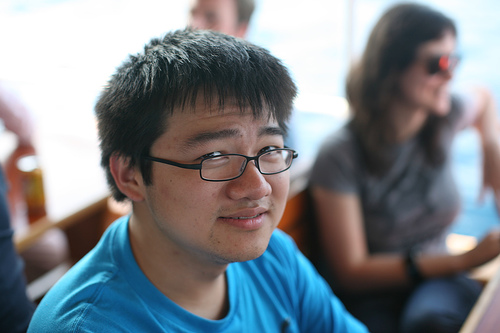
To Whom It May Concern:
Tim Hwang is a prime candidate for law school and for the legal profession. He sees and understands social networks. He is a student of how to build them. He understands that the structure of a functioning social network in the integrated media environment of cyber space is connected layered interests to a single focal point each object and audience for the others. He sees this in the structure of argument that makes a winning message in the space.
I refer you to his blog description of a breakfast at my house as my evidence.
Tim explores how social forces manifest themselves, for better or for worse, in technology and law. He thinks about how economic and social forces influence the design of the internet.
Tim is skilled in organization and detail-oriented work. He enjoys dealing with logistical problems, assembling resources for a
project, and collaborating with others towards a goal. He is a valuable person to have on your team. I have asked Tim to help me design and build a social educational network with poker thinking at its core. I recommend him.
***
truth
the evidence to prove it
the question to ask
what is the game
who are the players
[this is the entire session of cyberone: hold’em history with howard lederer and crandell addington — a wonderful hour (the opening sequence with crandell addington previously posted is followed here now by howard lederer in discussion with andrew woods and my real-world avatar.]
vision for nov 10
we are building poker university to take full advantage best we can of the utility of poker in education. we gather people together who have been educating in and through poker and in and through the strategy of learning and teaching with games of skill. we bring them together with people of technical and business skill who can build the environment we design. we invite singapore (both govt and game conference) and the harvard pitf program, gambit and the gaming coders. we invite the online poker industry and its founders. we invite them to a meeting in second life on Berkman Island and on the net at gpsts.org and if they can come in person or want to send their designee in Austin East on the Harvard Law School campus in Cambridge, Massachusetts, United States of America, Planet Earth.
our mission is to set the specs for the university we are building.
***
read Christopher Costigan. he’s right on..
http://www.gambling911.com/Ron-Paul-Poker-Players-Alliance-102607.html
Professor Nesson,
I am a freshman at the University of Alabama, and last week the
University forwarded “pre-lawsuit” letters from the RIAA to fourteen
students, and one of them happens to be my good friend. I have found
that the University of Alabama has the best interests of its students
at heart, but I think some lack of understanding about this issue was
shown on the University’s part when these letters were forwarded. I
read an op-ed you helped write in May of this year
(http://www.law.harvard.edu/news/2007/05/01_nesson.php), and I wish
that our administrators would take a similar view of this situation.
The RIAA is clearly afraid to go after Harvard, no doubt because it
knows it would face a hard fight (that they would probably lose) in
doing so. I’m afraid that our administration just wants to take the
easy way out. It’s like they think “Ok well the law says this, and we
don’t want our school to look like it is causing trouble, so here’s
this letter, sorry.” We’re only 18 years old, so the idea of this huge
and powerful association coming after us is intimidating to say the
least. Basically, I want to let the U of A know that our students need
more support. However, I can already see the email they would send back
to me. It would say that the University makes its students a priority
and everything is being done to handle this situation in the best way
possible. So I guess I just want some advice on what to do…if
anything at all.
Sincerely,
Elena Roca
***
dear elena,
the pressure point in the RIAA’s assault on universities is the subpoena to the university for the names of students to fill in the blanks on their john and jane doe law suits. it is at that point that the university has an opportunity to resist in a court of law. without resistance by the university the students are lost. without resistance by the university the university itself signs on to be industry’s copyright police under a legal regime that all the world knows makes no sense in an internet age.
i’ve blogged it. the federal rules of civil procedure which would guide the motion to quash instructs the judge to allow the university to demonstrate that the enforcement of the subpoena imposes an undue burden on the university. enforcement of one subpoena means, of course, enforcement of all like subpoenas, so that the whole policy of the university is forced to conform, and if one university, then all university unless one resists. the question for the future is: do we prefer a world in which the dead hand of the past in the form of bloated copyright law wielded and preserved by riaa’s litigation campaign changes university for ever — or should we preserve the open trusting scholarly relationships and roles in college campus life by recognizing their loss as an undue burden the music industry is imposing by its strategy of enforcement of outmoded law.
see if you can interest the crimson white in picking up this correspondence. crimson white for alabama. crimson for harvard.
eon
Invitation to the Poker Players Alliance Policy Forum
October 24, 2007 10:00 am – 11:00 am in Rayburn 2200
Poker in its many different variants has seen a proliferation across the United States of unprecedented proportions. Despite its growing popularity, poker is still a controversial
activity that sparks emotions and debates in elections and legislative battles. A year after the Unlawful Internet Gambling Enforcement Act (UIGEA) was signed into law, this panel will
discuss its impact on the poker community and the current Congressional proposals that seek to create a U.S. regulatory framework for Internet gaming and classify poker as a game of skill.
Moderator:
John Pappas, Executive Director, Poker Players Alliance
Panelists:
Howard Lederer, professional poker player
Professor Charles Nesson, Harvard University Law School
Andrew Woods, Global Poker Strategic Thinking Society
Radley Balko, Sr. Editor, Reason Magazine (www.theagitator.com)
Kenneth Adams, lead attorney in federal poker tax appeal, Dickstein Shapiro LLP.
Please RSVP to ppaforum@pokerplayersalliance.org
Questions? Contact the Poker Players Alliance in Washington D.C.
1111 19 th
Street NW, Ste. 1150
Washington, D.C. 20036
Yesterday our second club tournament.
hold’em poker
the story told by cradell addington of its start in texas
the formation and travels of the texas road gang
gathering in vegas
start of tournament play
thank you 1-2-3
thank you bodog news
thank you pokerati
we held a two-table tournament in the evening after our meeting in which both crandell addington and howard lederer played, won by justin liu, a first-year law student. crandell finished #2. howard made it to the final table.
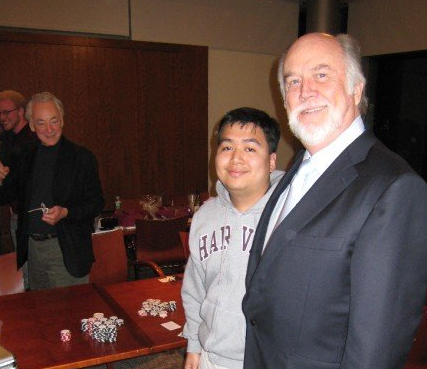
Prosecutorial abuse of Online Poker.
HLS To Go ‘All In’ Versus Yale
Published On Thursday, October 11, 2007 2:19 AM
By CHELSEA L. SHOVER
Contributing Writer
ARTICLE TOOLS:
E-mail this Article
Printer Friendly Version
Write a Letter to the Editor
On the eve of Nov. 17, while much of the Harvard community is gearing up for “The Game” against Yale, a handful of law school students will be prepping to play a very different sort of game against the same rival.
That night, members of the Harvard Law School (HLS) chapter of the Global Poker Strategic Thinking Society (GPSTS) will challenge the society’s Yale chapter in a poker tournament.
Founded by Weld Professor of Law Charles R. Nesson ’60, GPSTS aims to “create an open online curriculum centered on poker that will draw the brightest minds together,” according to the group’s online statement. The GPSTS currently has chapters organized at Stanford, UCLA, and Brown, in addition to Harvard and Yale.
Nesson and third-year law student Andrew M. Woods, the interim president of the HLS chapter, said that the group hoped to change the reputation of poker from one of illegal gambling to that of a valuable educational tool.
“Poker teaches cognitive ability in a way we just don’t have in education now,” Woods said yesterday afternoon.
While the group is not allowed to gamble during meetings, they spent their first meeting on Tuesday night discussing some of the finer points of the card game.
“Anybody that somehow thinks interest in poker is a bad thing would be convinced just by seeing and listening to these kids talk,” said Nesson.
Woods said that the GPSTS would host several events open to the Harvard community over the semester. A panel discussion with poker champions Howard Lederer and Crandell Addington is expected to be held on Oct. 15. The group plans to hold a discussion on the dispute over online poker and a day-long conference on the educational value of poker in November.
The GPSTS also plans to launch a National Collegiate Poker Tournament in March.
“It will hope to capture the same spirit of the March Madness basketball tournament,” Woods said.
The debate over the legality of poker focuses on whether it is a game of chance or a game of skill.
To study the dispute, GPSTS organizers said they plan to use duplicate poker decks, setting a deck up in the same way at ten different tables. This means that players are not only competing among the others at their table but also with their counterparts with the same hands at other tables.
“It’s a good way of really demonstrating and determining who has the most skill in a game,” Woods said.
While a Harvard undergraduate chapter of GPSTS does not yet exist, two students—Brian M. Wan ’08 and Jason A. Caloras ’08—are in the process of creating one.
“What we’re going to be doing is trying to help legitimize poker,” said Wan.
